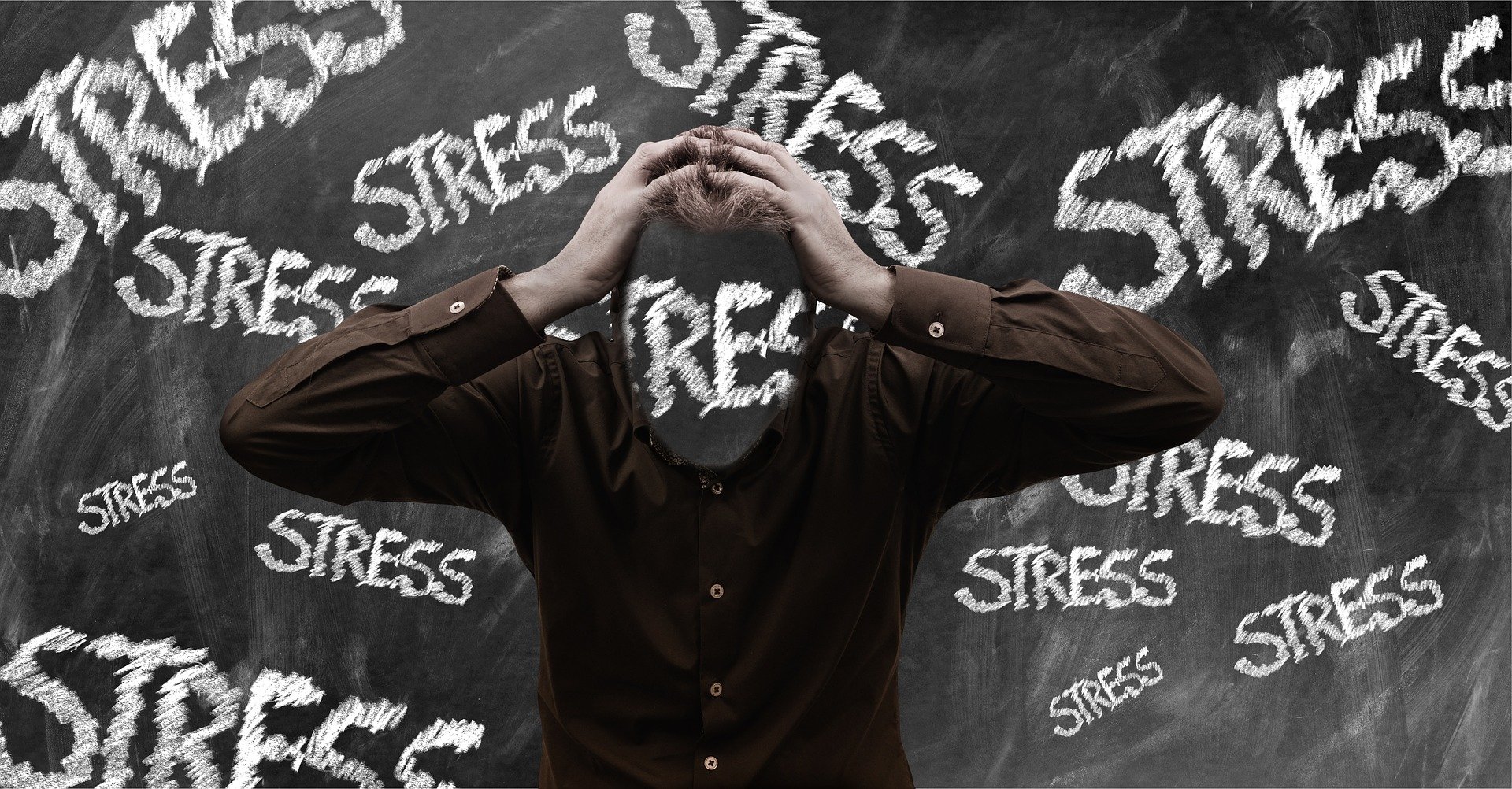How Is Stress Related to Allergy Symptoms?

Stress and allergies go hand in hand.
Stress wreaks havoc on energy. Stress is your body's response to situations, inside and out, which interfere with the normal balance in your life. Virtually all of the body's systems - digestive, cardiovascular, immune, and nervous system - make adjustments in response to stress.
Our Gut - the flora in our digestive system is easily prone to upset and disruption by external sources, like our hormones. This is where stress, self-criticism, and anxiety come into play as they change the pH level (the acid/alkaline balance) in your intestines. The intestinal tract is one of the first areas of the body to react to fear or personal stress (think of the nausea and/or loose-bowel feeling that can accompany stage fright, etc.). In a balanced system, once the stress is reduced, the pH straightens out and symptoms may disappear. In a weakened system, such as occurs under unrelenting stress, the intestines stay irritated and contribute to chronic discomfort.
When we are all stressed out, our body releases hormones like adrenaline and other chemicals, including histamine, the powerful chemical that leads to allergy symptoms. While stress doesn't actually cause allergies, it can make an allergic reaction worse by increasing the histamine in your bloodstream.
Chronic stress that persists for weeks, or even months produces cortisol, the body's main stress-induced hormone, which may lead to varying levels of fatigue, including adrenal fatigue. When cortisol becomes elevated and remains so for a while, it affects the cells that comprise your immune system. The immune system can't keep infections or diseases at bay as it would do normally. Viruses or bacteria proliferate to the point where they can infect many cells, leading to symptoms and increased chance of illness.
If you suffer with allergy symptoms, you know all about the stress of having a chronic condition. Not only is it difficult to live with all the various -often debilitating symptoms - but poor sleep patterns, that can lead to fatigue, exhaustion and problems concentrating - often leaving your body's natural resistance completely exhausted, too. Allergy medicines can cause appetite changes, low energy, and even irritability. All you want is relief: from the symptoms, the stress, all of it.

When stress causes Adrenal Fatigue - Burnout
Prolonged stress can lead to Adrenal fatigue. When we are stressed the Adrenal glands produce the 'stress hormone' Adrenaline. Adrenaline is responsible for our 'fight and flight' response and when this response is 'chronically 'activated by prolonged stress it can lead to 'burn out'. A deficiency in adrenal gland functioning can result in debilitating symptoms. It is a condition - often unrecognised - that likely affects millions of people. Adrenaline produced by stress usually stays in the body for app. 4 weeks, until it is fully expelled. The only way to release it faster is through exercise! (Children usually release excess adrenalin through crying!).
For example, when we drink coffee / caffeine the adrenal glands are signalled to release adrenaline. So our emergency reserve is released just because we told it to by drinking a cup of coffee. But what happens when we repeatedly call for adrenaline on top of being stressed? The body will go into a very mild form of cachexia (wasting syndrome - fatigue, weakness, muscle atrophy,...). You may feel exhausted and need lots of stimulating foods to keep going. You may have symptoms such as tiredness, fearfulness, anxiety, depression, reduced memory, difficulties in concentrating, insomnia or simply feel worn-out. You may well be suffering from Adrenal Fatigue Syndrome.
Adrenal fatigue is not yet a recognised medical condition. Your adrenal glands play a very important role in helping your body respond to physical or psychological stress. It may be that adrenal fatigue is not a medical condition but a description of how you may feel when you are very stressed. There is no evidence that people with adrenal fatigue have anything wrong with their adrenal glands.
Signs and Symptoms of Adrenal Fatigue include:
Food intolerance, allergies, asthma, bronchitis or chronic cough, behaviour problems -fearfulness, anxiety, depression, memory problems, dizziness /lightheaded (postural hypotension), decreased ability to handle stress and increased effort to perform daily tasks, dry and thin skin, excessive thirst and urination, cravings for salty, fatty, and high protein food such as meat and cheese, food intolerances, headaches, hemorrhoids, hyperpigmentation, hypoglycemia, indigestion - alternating constipation and diarrhoea, inflammation, lack of energy, Low body temperature, muscle weakness and back pain, nervousness, palpitations - heart pounding, recurring infections, sleep disturbances/Insomnia, swelling, varicose veins, weight problems-tendency to gain weight and unable to lose it.
Several recommended supplements:
Vitamin B-Complex is a very important stress buster, comprises of the essential B Vitamins - B1, B2, B3, B5, B6, B9, B12 plus the vitamins Biotin, Choline and Inositol. The eight B-Vitamins are needed for the proper functioning of almost every process in the body and are essential for healthy functioning of the nervous system, correct digestion. A Vitamin B deficiency can lead to decreased energy production, lethargy and fatigue, impaired digestion and deficiency of essential nutrients.
Magnesium - The body’s nervous system relies on magnesium to effectively cope with stress. It is one of the most important nutrient needed to reduce the flow of adrenaline in the body and to lower blood pressure and relax contracted muscles. Adequate magnesium intake is a must if you want to effectively manage stress. Without sufficient magnesium reserves, muscles stay tense, blood pressure remains elevated, and adrenaline keeps flowing. Our bodies stay in a constant state of fight or flight / red alert status. For people feeling run down or suffering from anxiety, talk therapy may be a helpful secondary treatment consideration, but talk therapy isn't a substitute for correcting a biological mineral deficiency.
Adaptogens / adaptogenic herbs:
Ashwagandha is perhaps best known for its ability to reduce stress. Traditionally, organic ashwagandha has been prescribed as a nerve tonic and adaptogen - an agent which helps the body adapt to various emotional and physical stressors. It has classically been used in India for conditions such as failure to thrive in children, weakness and debility in old age, rheumatism, constipation, insomnia, nervous conditions, chronic stress, goiter, joint inflammation, parasites, hormone balance, and more. Ashwagandha is known to help people strengthen their immune system health after illness, chemotherapy, or surgery. It is a highly effective, evidence-based remedy to help reduce stress levels and anxiety - by lowering cortisol levels and mimicking the inhibitory neurotransmitter GABA.
Maca - also called “Peruvian Ginseng” an endocrine adaptogen, that helps balance hormones, nourishes and reduces stress hormones. PMS/Menopause, balance and enhance Male hormones, helps with mood, relieves depression, reverse increase energy/stamina - may cure chronic fatigue, hypothyroidism, natural “steroid” like properties, aids in detoxification, improves skin and hair, increases metabolism - may help with weight loss / obesity. (best taken as capsule!)
Suggested read:
James L. Wilson has written a very empowering work “Adrenal Fatigue: The 21st Century Stress Syndrome”. Packed with vital information about the condition, he helps readers determine if they have adrenal fatigue and learn how to treat it. A very informative and reader-friendly book - about a common debilitating medical condition - that goes largely undiagnosed and untreated.
More information and help: www.adrenalfatigue.org, including a health-checker: Dr. Wilson’s Adrenal Fatigue Questionnaire: www.adrenalfatigue.org/take-the-adrenal-fatigue-quiz



